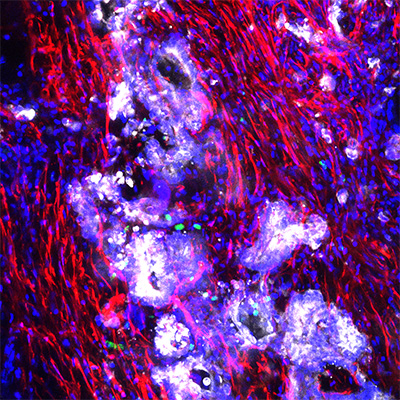カリフォルニア大学サンディエゴ校の研究者が、長らく効果的な研究や治療法の開発が困難であった希少疾患の3次元培養法を開発 UC San Diego researchers develop a 3-D culture for a rare disease that has long defied effective study and development of therapies
2022-11-01 カリフォルニア大学サンディエゴ校(UCSD)

Confocal image of a living tissue slice derived from a patient tumor with metastatic appendiceal cancer (mucinous carcinomatosis peritonei). Immunofluorescence reveals the presence of cancer cells (white), fibroblasts (red) and immune cells (green). Cell nuclei are labeled blue. Photo credit by Jonathan Weitz, UC San Diego Health
<関連情報>
- https://today.ucsd.edu/story/appendiceal-cancer-gets-its-own-preclinical-model
- https://aacrjournals.org/clincancerres/article-abstract/28/21/4793/709821/An-Ex-Vivo-Organotypic-Culture-Platform-for
ヒト虫垂癌の機能的研究のための生体外器官型培養プラットフォームは、顕著で異質な免疫学的景観を明らかにする An Ex Vivo Organotypic Culture Platform for Functional Interrogation of Human Appendiceal Cancer Reveals a Prominent and Heterogenous Immunological Landscape
Jonathan Weitz;Tatiana Hurtado de Mendoza;Herve Tiriac;James Lee;Siming Sun;Bharti Garg;Jay Patel;Kevin Li;Joel Baumgartner;Kaitlin J. Kelly;Jula Veerapong;Mojgan Hosseini;Yuan Chen;Andrew M. Lowy
Clinical Cancer Research Published:November 01 2022
DOI:https://doi.org/10.1158/1078-0432.CCR-22-0980
Abstract
Purpose:
Epithelial neoplasms of the appendix are difficult to study preclinically given their low incidence, frequent mucinous histology, and absence of a comparable organ in mice for disease modeling. Although surgery is an effective treatment for localized disease, metastatic disease has a poor prognosis as existing therapeutics borrowed from colorectal cancer have limited efficacy. Recent studies reveal that appendiceal cancer has a genomic landscape distinct from colorectal cancer and thus preclinical models to study this disease are a significant unmet need.
Experimental Design:
We adopted an ex vivo slice model that permits the study of cellular interactions within the tumor microenvironment. Mucinous carcinomatosis peritonei specimens obtained at surgical resection were cutoff using a vibratome to make 150-μm slices cultured in media.
Results:
Slice cultures were viable and maintained their cellular composition regarding the proportion of epithelial, immune cells, and fibroblasts over 7 days. Within donor specimens, we identified a prominent and diverse immune landscape and calcium imaging confirmed that immune cells were functional for 7 days. Given the diverse immune landscape, we treated slices with TAK981, an inhibitor of SUMOylation with known immunomodulatory functions, in early-phase clinical trials. In 5 of 6 donor samples, TAK981-treated slices cultures had reduced viability, and regulatory T cells (Treg). These data were consistent with TAK981 activity in purified Tregs using an in vitro murine model.
Conclusions:
This study demonstrates an approach to study appendiceal cancer therapeutics and pathobiology in a preclinical setting. These methods may be broadly applicable to the study of other malignancies.



この疾患は稀であるため、臨床組織へのアクセスは稀である。
新生物の大半は粘液性の組織であり、顕微鏡での評価や培養が難しいという特徴がある。
マウスにはヒトの虫垂に相当する部分がないため、遺伝子改変モデルとしては不向きである。
研究者たちは、生きた虫垂がん細胞の器官型スライス培養を開発した。器官型スライスとは、ある器官を3次元的に培養したものである。この場合、スライスは手術で患者から摘出した虫垂癌組織から作られ、生体外、つまり患者の外で培養される。
著者らは、このオルガノタイピングモデルは、細胞の混合状態や挙動において盲腸腫瘍を正確に再現しており、オルガノイドや患者由来異種移植(マウスやラットなど別の種で培養した組織を移植する方法)など、他のアプローチに加えて、新しい研究手段として有望であると述べている。